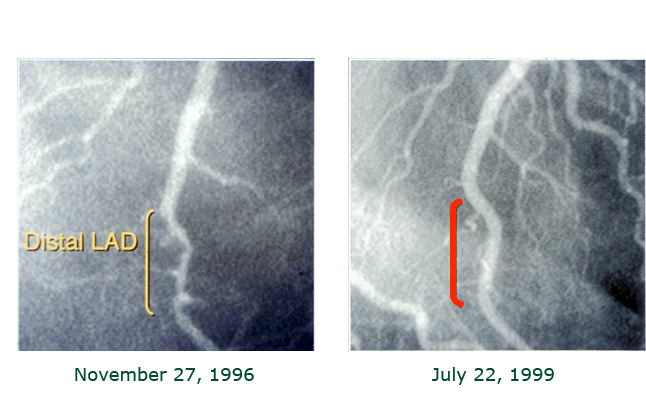
Many Canadians are confused about cholesterol and, when they are exposed to misinformation presented in the media, their level of confusion often worsens. For example, a recent episode of The Nature of Things entitled “The Cholesterol Question” did a poor job of investigating the role that cholesterol plays in heart disease. As I watched the conflicting documentary I could only imagine the uncertainty growing daily in the minds of health conscious Canadians. The spread of misinformation and the lack of proper knowledge on health issues is, in my opinion, a leading cause of death in North America. This article will clarify important facts that were either not properly presented, or completely omitted from the investigation. Ultimately, the goal is to empower you with the real truth about cholesterol and heart disease. (The documentary in question aired on the CBC on October 30th, 2014- as I write this article it can still be seen on CBC’s website).
What is “normal” cholesterol? And does high cholesterol predict a heart attack?
Within the opening sequence of the documentary, a provocative statement is made that 50% of people who have a heart attack or a stroke have normal cholesterol levels. This is an incorrect assertion, one that misleads the viewer to conclude that cholesterol is not a strong biomarker of cardiovascular disease. After all, if people with normal cholesterol are having heart attacks, what’s the point of monitoring our cholesterol in the first place? Let’s put an end to the misinformation by looking at the facts:
The documentary does not properly address what constitutes a “normal” range of cholesterol. Canadians as well as Americans are typically advised to keep their total cholesterol below 5.2 mmol/L (200 mg/dL), and over 6.2 mmol/L (240 mg/dL) is considered high. However, according to Dr. William Castelli, former director of the Framingham Heart Study (the largest ongoing study ever conducted on cardiovascular disease), the ideal cardioprotective cholesterol level is far lower than what is arbitrarily considered to be normal in North America. If heart attack prevention is the goal, Dr. Castelli recommends a level below 3.9 mmol/L (150 mg/dL).1 Fact: in almost 60 years of the Framingham Heart Study, only 6 people with cholesterol under 3.9 mmol/L have had a heart attack, and at least one of the six had an underlying medical condition. A cholesterol level below 3.9 mmol/L means that you are virtually heart attack proof, and the science on this is consistent. Once you go over 3.8 you enter a danger zone- about one third of heart attacks in North America occur in people with cholesterol levels between 3.9 and 5.2. Unfortunately, when the doctor in the CBC documentary informs us that a majority of people who suffer a heart attack have a normal level of cholesterol, he neglects to mention that the cholesterol of these people still places them in the danger zone. In populations studied in all parts of the world where heart attacks are extremely rare, the average cholesterol levels are far lower than what is considered to be normal by our North American standards.2 So if you want a normal level of cholesterol, you should expect a normal risk of heart disease. But if you want to truly lower your risk, almost down to zero, a total cholesterol lower than 3.9 mmol/L is your target.
“People with total cholesterol levels under 150 just don’t get heart disease.” Dr. William Castelli.1
What you have just learned is that the CBC documentary compares people with very high cholesterol to people who have high cholesterol (considered normal in North America). Predictably, the incidence of heart attack is high in both of these groups, leading to the erroneous suggestion that cholesterol doesn’t matter. But if the researchers featured in this documentary were to look at individuals with a total cholesterol of under 3.9 mmol/L – which should be the normal standard – they would be reporting a significant lower rate of heart attacks from this group.
Does it make a difference if you have low cholesterol due to diet and lifestyle versus medication?
The doctors in the documentary also fail to address the important distinction between people who have naturally low cholesterol due to a healthy diet and lifestyle, and people who control their cholesterol level with statins (cholesterol lowering medication). Surely they understand that achieving a good cholesterol level through diet and lifestyle is not the same as popping pills. The documentary does challenge the effectiveness of cholesterol medications; their benefits have been overstated, people on them do suffer from heart attacks in high numbers, and statins have a long list of dangerous side effects. Yet the researchers neglect to mention that this speaks more to the failure of drugs than it does to the failure of using cholesterol as a marker to determine heart attack risk. Instead, they make a general blanket statement that people with normal levels of cholesterol suffer from the same rate of heart attacks as those with high cholesterol. The truth, however, is that low cholesterol achieved through diet is a very accurate indicator that the person is not at risk.
Here is what some of the leading experts on cholesterol and heart disease have to say:
- In addition to stating what science has overwhelmingly shown to be the ideal cholesterol level (under 3.9 mmol/L), Dr. William Castelli has said that “a low-fat plant-based diet would not only lower heart attack rate by 85%, but would also lower the cancer rate by 60%”.1
- The president of the American College of Cardiology, Dr. Kim Williams, has stated on numerous occasions that if the public adopted a plant-based diet there would be no more need for cardiologists.3
- According to Dr. Campbell (The China Study), “Lower blood cholesterol levels are linked to lower rates of heart disease, cancer and other Western diseases, even at levels far below those considered safe in the West.”2
The preponderance of the scientific evidence has clearly shown us that populations living on a predominantly whole foods plant-based diet naturally have cholesterol levels below 3.9 mmol/L, are not on statins, and have the lowest rates of heart disease on the planet. Furthermore, even when populations with lower cholesterol are studied, with every increase you see in cholesterol above 3.9 mmol/L, say from 3.9 to 4.4 mmol/L, you also see an increase in disease.2 This is yet another reason why the former director of the Framingham Heart Study, Dr. Castelli, recommends that we consume a plant-based diet and aim for under 3.9 mmol/L. Fact: according to the largest and most comprehensive studies ever conducted on cardiovascular health, and chronic health issues in general, elevated total cholesterol has been the strongest and most consistent bioindicator of disease. This doesn’t mean that high cholesterol necessarily causes heart attacks, but it does imply that your cholesterol level (without statins) is a very good indicator of how healthy you are in general, and it says a lot about the type of diet you are on.
Is inflammation a major cause of heart disease?
The CBC documentary brings us to Dr. Paul Ridker who is not convinced that cholesterol has much to do with heart disease- he’s the doctor who made the opening statement that half of the people who have a heart attack have normal cholesterol. Dr. Ridker’s hypothesis is that inflammation is the cause of heart attacks, and he spent many years searching for a measure of inflammation in the blood that could predict a heart attack 5-15 years down the road. He analysed blood samples from heart attack victims to see if he could find the smoking gun. This led him to the discovery that C-Reactive Protein (CRP) levels are a very good predictor of heart attacks. One of the side effects of cholesterol lowering medications is that they also lower CRP, and so Dr. Ridker suggests that these medications could help prevent heart attacks for certain people who have a normal level of cholesterol. However, the study that supports this view was funded by the same pharmaceutical company that makes the statin Crestor, and this obvious conflict of interest seems to have affected both the results and methods of the study. Yet this has not stopped Dr. Ridker from pursuing his hypothesis- he is currently involved in another study using an anti-inflammatory arthritis drug to see if it can reduce the rates of heart attack.
Are you confused? You should be. First it seems that the documentary is investigating the truth about cholesterol and heart attack risk for the benefit of the general public, warning us that statins are not very effective, and then a sharp turn is taken as the focus shifts to what is going on in the multi-billion dollar industry of drug research and development- and this is where we are told that the use of statins and anti-inflammatories could expand to include a whole new segment of the population. Let’s leave all of the confusion (and some shady science) behind and focus on what you need to understand in regards to your health:
- Yes, inflammation, along with total cholesterol, is a good bioindicator of heart attacks. Dr. Ridker is correct on this point.
- No, you do NOT have to take statins or any anti-inflammatory drug to reduce CRP. You can reduce inflammation just with the food you choose to eat. Studies have shown us that, in just two to three weeks on a low-fat plant-based diet, CRP levels can be lowered by up to 45% in women4, 39% in men5, and 41% in children6. Meanwhile, an animal-based Atkin’s style diet was shown to be the fastest way to increase inflammation regardless of weight loss.7
Do heart attacks begin in the gut?
A little deeper into the documentary we are introduced to Dr. Stanley Hazen who, similar to Dr. Ridker, has also spent years looking at blood samples to see what, beyond cholesterol, can be linked to heart attacks. He looked at studies of thousands of subjects and found one compound called Trimethylamine N-Oxide (TMAO) that was strongly associated to cardiac risk. Dr. Hazen then discovered that TMAO is created by the bacteria in our gut when we consume carnitine- an amino acid found in animal flesh. High levels of TMAO appeared after test subjects consumed just one steak. Dr. Hazen said that this was his eureka moment.
“Bacteria are having a huge impact on things that appear in our bloodstream. That compound [TMAO] will accelerate heart disease. It both enhances cholesterol to get deposited into the cells of the artery wall and it also inhibits the removal of cholesterol so the net effect is more buildup.” Dr. Stanley Hazen.
Dr. Hazen was very excited about this discovery, however, as he noted in the documentary, he has not eliminated red meat from his diet- he just eats it less frequently. At least he had the guts (no pun intended) to publish his study- many scientists too often let their personal biases affect their work. Here are the main points of Dr. Hazen’s discovery:
- TMAO is a good bioindicator of heart disease.
- TMAO is created by your gut bacteria after you consume carnitine- carnitine is found in animal flesh (fish included).
- The gut bacteria of vegans cannot produce atherogenic-promoting TMAO.
Have you noticed a trend? So far we have discussed three risk factors for heart disease- cholesterol, inflammation and TMAO- all of which can be dramatically lowered with a proper plant-based diet.
What about diabetes and genes?
According to the documentary, diabetes triples your risk of heart disease. And, for this segment of the program, we are presented with scientists who are working on DNA studies to isolate specific genes that can “solve the puzzle” as to why people with diabetes are at higher risk for heart disease. The documentary’s focus on genetics is extremely appalling to watch. The mainstream media will have you believe that a single gene that causes a disease can be isolated, and then a drug can be created to control that gene. This is far from the truth. My video on breast cancer provides more information on the shady business of genetic research for chronic disease. It has been well documented that no single gene is responsible for chronic disease, yet genetic research is largely and disproportionately funded because this is where pharmaceutical companies can make more money. Furthermore, it allows people to blame their genetics instead of taking a proactive approach to preventing and reversing disease. Is anybody interested that type 2 diabetes can easily be reversed in just a few weeks? The public deserves to know the truth:
- You can reverse type 2 diabetes in 3 weeks by switching to a whole foods plant-based diet. Professor James Anderson, a leading expert on diabetes, conducted a study where he placed 25 type 2 diabetics on a high-fibre, high carbohydrate, low-fat diet.8 This was a very high quality study conducted in a hospital setting. After just 21 days on the diet 24 of the 25 patients no longer required insulin to control their blood sugar. The same was done with type 1 diabetics and they were able to reduce their insulin by 40%- an incredible result seeing that it was once considered impossible for diet to have any impact on type 1 patients. Another study at the Pritikin Center yielded similar results- 34 of 40 patients were able to stop all of their medications after 26 days on a plant-based diet and exercise program.9 Many more studies of this nature have been conducted and the results have been very consistent.
- In studies where patients switch to a plant-based diet and reverse diabetes, such as the ones mentioned above, they also succeed in lowering their cholesterol by 30% or more in just 2-3 weeks.10 In other words, their cholesterol falls to below 3.9 mmol/L- a very good sign that they won’t have a heart attack- and it remains low for as long as they stick to the diet.11
My article on type 2 diabetes covers common misconceptions about the best course of treatment for this disease.
Can we really prevent & reverse cardiovascular disease?
“The art of medicine consists of keeping the patient amused while nature heals the disease.” Voltaire
We can spend all of our time looking at cholesterol, markers of inflammation, blood glucose levels, TMAO, as well as other results of our blood test, but, the only end point that truly matters is living a full and healthy life free from disease. Now I want you to imagine the story of a man who, at age 44 and with normal blood pressure and a cholesterol of 4 mmol/L, has a heart attack. He survives only to find out three days later that he doesn’t have many months left to live due to advanced coronary artery disease. The man, who happens to be a doctor, looks at all of the research and decides that he must switch to a low-fat plant-based diet in order to save his life. Nearly two decades later this man is still alive and his cardiovascular disease is completely reversed. This is a true story and the photos below show his before and after angiogram- you are looking at his left anterior descending artery, the lower third so damaged in the before image that he couldn’t even have stents put in, and bypass surgery was impossible. And the second angiogram, taken less than 30 months following his heart attack, shows a complete recovery. He refused to take statins and, through diet alone, reduced his cholesterol from 4 mmol/L to 2.3 mmol/L. Thank goodness he was one of Dr. Esselstyn’s patients.
But there is nothing unique about this man’s recovery. In fact, in Dr. Esselstyn’s study,12 every single patient who followed a strict low-fat plant-based diet achieved the same result- they all reversed cardiovascular disease and are still alive decades later. Not one of them had another cardiovascular related incident. These were all patients who were once knocking on death’s door and were able to come back from it. Now imagine just how heart attack proof we would all become if we switched to a plant-based diet before we suffered from advanced cardiovascular disease. If a drug could provide us with this level of protection it would become the biggest selling drug in the history of the pharmaceutical industry. But we already have this medication- it’s the food that we choose to eat, and the food we choose to avoid.
And, in case you were wondering, the cholesterol level of all of the patients who reverse cardiovascular disease, and live heart attack free, is below 3.9 mmol/L- a level that is virtually only achievable on a whole foods, low-fat, plant-based diet.
Marc Jaoude
Naturopath, Health Educator
Nutrition & Exercise Specialist
REFERENCES:
- Schneider R. “The Framingham Heart Study: It’s about your heart.” Available at: http://www.examiner.com/article/the-framingham-heart-study-it-s-about-your-heart Last accessed: November 7, 2014.
- Campbell, T. Colin, and Thomas Campbell. (2006). The China Study: The Most Comprehensive Study of Nutrition Ever Conducted And the Startling Implications for Diet, Weight Loss, And Long-term Health. Dallas, TX: Benbella Books, 2006.
- Williams K. “CardioBuzz: Vegan Diet, Healthy Heart?”. Available at: http://medpagetoday.com/Cardiology/Prevention/46860. Last accessed: November 7, 2014.
- Wegge JK, Roberts CK, Ngo TH, Barnard RJ. “Effect of diet and exercise intervention on inflammatory and adhesion molecules in postmenopausal women on hormone replacement therapy and at risk for coronary artery disease.” Metabolism. 2004 Mar;53(3):377-81.
- Roberts CK, Won D, Pruthi S, Kurtovic S, Sindhu RK, Vaziri ND, Barnard RJ. “Effect of a short-term diet and exercise intervention on oxidative stress, inflammation, MMP-9, and monocyte chemotactic activity in men with metabolic syndrome factors.” J Appl Physiol. 2006 May;100(5):1657-65.
- Roberts CK, Chen AK, Barnard RJ. “Effect of a short-term diet and exercise intervention in youth on atherosclerotic risk factors.” Atherosclerosis. 2007 Mar;191(1):98-106.
- Rankin JW, Turpyn AD. “Low carbohydrate, high fat diet increases C-reactive protein during weight loss.” J Am Coll Nutr. 2007 Apr;26(2):163-9.
- Anderson JW. “Dietary fiber in nutrition management of diabetes.” In: Vahouny GV, Kritchevsky D, eds. Dietary Fiber: Basic and Clinical Aspects. New York: Plenum Press, 1986:343-360.
- Barnard RJ, Lattimore L, Holly RG, et al. “Response of non-insulin-dependent diabetic patients to an intensive program of diet and exercise.” Diabetes Care 5(1982):370-374.
- Anderson JW, Chen WL, Sieling B. “Hypolipidemic effects of high-carbohydrate, high-fiber diets.” Metabolism 29(1980):551-558.
- Story L, Anderson JW, Chen WL, et al. “Adherence to high-carbohydrate, high-fiber diets: long-term studies of non-obese diabetic men.” J Am Diet Assoc. 85(1985):1105-1110.
- Esselstyn DB, Jr. “Updating a 12-year experience with arrest and reversal therapy for coronary heart disease; An overdue requiem for palliative cardiology.” Am J Cardiol 1999; 84:339-341




Yes, please keep up the good – and very important work.
Thank you for your words of encouragement Jim.
Heart disease is rampant in India, a country with a high Hindu Vegetarian population. What’s the explanation?
Hi there Ricardo,
a vegetarian diet isn’t necessarily healthy. Milk, cheese, fried food, and high sugar drinks are all vegetarian! These are not the foods that can help reverse or prevent heart disease. Dr. Esselstyn’s work has shown us that even the consumption of vegetable oils can be problematic. If you want the healthiest diet on earth you would turn to a whole food plant based diet with an emphasis on raw living foods (as described on this website).
I tease my Indian clients that India has one of the worst vegetarian diets in the world. Most of the times the food is overcooked, there is rarely enough raw living food, and there’s simply too much fat and sugar. As an example, Indian naan bread is made from white flour and often coated with a layer of butter or ghee- and this is served with a typical meal.
Having said that, if you know what to order or how to best prepare it, you can enjoy the great taste of many cuisines from around the world without sacrificing your health in the process. I am a fan of Indian style dishes and enjoy the variety of spices that are typically used.
All the best.
I agree with Marc totally. I was brought up a Vegetarian with traditional cooking, but now I find it very difficult to enjoy my mums cooking. It is always over cooked, laden with oil and virtually always accompanied with processed white rice or white wheat flour. I use the spices and herbs, but only to flavour the foods and not overcook them (dress them but steam them first). My last visit to India in April was tough as ALL the foods were laced with so much sugar. At least my mum’s cooking did not involve sugar in everything. I found out that Gujarat State has become the highest consumer of cheese. Remember this is heavily processed cheese, which is more like a polymer than real food with good bacteria. Western exports eh!!
Thank you for sharing your story and insight. I should hire you to speak with my clients from India! It’s very interesting that the states of Gujarat and Maharashtra consume so much cheese. Unfortunately, this doesn’t seem to be slowing down. The people there are in need of a public service announcement to cut back on their cheese, and focus more of their diet on plant-based foods.
Thank you for the article. Keep it up. Society needs more focus on health, and with your good efforts the information you provide will become more mainstream.
Thank you very much for your words of encouragement. They are much appreciated. Have a wonderful New Year.